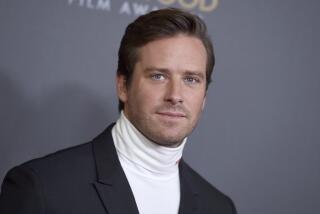A Virtual Spy : DOSSIER: The Secret History of Armand Hammer. <i> By Edward J. Epstein (Random House: $30, 418 pp.)</i>
- Share via
Nowhere in America are life and artifice intertwined as they are in Los Angeles. Wealth--and the ostentatious spending of it--assure entree into a transient high society created by early 20th century economic pirates and now dominated by Hollywood. Our history is marked by stories of the newly rich who quickly rose to political and economic power, then ended up in prison. When Dr. Armand Hammer moved here in the ‘50s, marrying his third wife, Frances, and moving into her Holmby Hills home, upper-crust Angelenos didn’t look beyond the color of his money and his tall tales. Even though he pleaded guilty to misdemeanor charges for his part in the Watergate scandal for illegally contributing $54,000 to Richard M. Nixon’s political funds, his influence continued to grow.
Armand Hammer and Los Angeles were a perfect match. For money and smooth talk are the passports to this city, a place, like the old frontier, where the newly rich discard their old lives and reinvent themselves.
In “Dossier: The Secret History of Armand Hammer,” Edward Jay Epstein’s fascinating, painstakingly researched book, Hammer’s old life is revealed in fascinating detail, exposing him as the liar and conniver that he was.
Among Epstein’s more shocking revelations is that Hammer acted as a virtual spy for the Soviet Union, a conduit for money that financed Communist espionage operations. This will no doubt come as a shock to the Angeleno pooh-bahs--some of them rock-ribbed, Joe McCarthy-loving right wingers--who bowed and scraped before Hammer, hoping for an invitation or, more likely, a donation to a favorite cause.
The whole story is laid out in “Dossier.” Epstein’s sources are rock solid: the Soviet Commissariat of Foreign Trade; a top official’s report to Lenin; the archives of the Comintern, the Kremlin organization in charge of the international communist conspiracy; various American intelligence and law enforcement agencies, which kept Hammer and his family under surveillance from the early part of the century until almost up to his death in 1990.
From these sources, Epstein discovered that in 1921 the Soviet secret police, the Cheka, gave Hammer “$75,000 to secretly take back with him to New York. This money, which would be the equivalent of $600,000 today, was to be distributed to underground agents of the Comintern. . . . [Hammer] departed Russia with a new burden of secrets--his commitment to using his family’s company to help finance Soviet espionage in America.”
When I used to write about Occidental Petroleum Corp., I always figured Hammer, who headed the international oil company, was some kind of a Soviet spy.
It was an improbable theory. Hammer was the leading light of the stuffy conservative Los Angeles cultural and philanthropic scene. I remember interviewing him when he was trying to drill for oil off Pacific Palisades, a project violently opposed by residents, environmentalists and just about everyone who enjoyed the beach. So desperate was he for favorable publicity that he even consented to talk to me, a reporter from City Hall. I found him to be a crafty old charmer who reminisced entertainingly about his friendship with Lenin and other leaders of what then-President Ronald Reagan termed the “evil empire.”
The Lenin connection made me suspicious, as did Doc Hammer’s past. His father was an old Bolshevik who had come to the United States from his native Russia. Armand Hammer was feted whenever he visited Moscow. He was even tight with the Stalin crowd, the evil empire’s most evil rulers. The Russians cut him in on big business deals. What explanation was there except that Hammer was playing for the other team?
From that connection flowed other business deals, some profitable for Hammer, others not, but all of them of great use to the Soviet Union. When workers at Hammer’s Russian asbestos mine went on strike in 1922 over poor working conditions, he called in the Cheka, which suppressed the strike. When a railroad station boss demanded a bribe to move food to the mine, the Cheka stepped in again and, as Hammer liked to boast, the station commandant was shot.
His relationship with the Soviet secret police is just one--and for me the most interesting--revelation in a book that is a model of biographical research. Sometimes, “Dossier” is overweight with detail, but that can’t be avoided. Hammer’s life was built on layers of deceit, and Epstein uncovers them, one by one. When finished, he has provided a painful look at the corruptibility of government and the gullibility of the business, economic and social elite.
Deception came easy to Hammer, Epstein reveals, and there were so many lies they can’t be listed in the space allocated to this review. But I have some favorites:
* Hammer insisted that his mistress, the art consultant to the Armand Hammer Foundation, change her name, appearance and voice so that Hammer’s wife, Frances, who was suspicious of the relationship, would not recognize her.
* Although Hammer, who studied at the Columbia College of Physicians and Surgeons as a youth, reveled in the title of doctor, he left unsaid the fact that a woman died after he performed an illegal abortion on her in 1919. His father, in whose office Hammer was working, took the fall for him and went to prison.
* Hammer was Jewish but denied his heritage most of his life. Dealing with the Soviets, he was an atheist. When developing oil fields in Muslim Libya, he was a Unitarian. Only when death neared did Hammer return to Judaism and, in fact, schedule a lavish bar mitzvah ceremony, but he died before it took place.
* The doctor portrayed himself as a great art connoisseur and financed the Armand Hammer Museum of Art and Cultural Center in Westwood to house his art collection. But Epstein reveals Hammer’s “cynical manipulation of the authenticity of works of arts,” including the faking of supposed originals from the Faberge workshops in Russia. “To him,” writes Epstein, “collecting was a confidence game in which he supplied the necessary authentication, which took the form of a label, genuine or fake.”
Hammer loved talking about himself as an international businessman, above politics. When I interviewed him about his Palisades drilling scheme, he spoke in sweeping terms of the global oil shortage. What I didn’t know but learned from reading Epstein’s book was that the FBI was investigating Hammer at the time for engaging in “a conspiracy to bribe members of the Los Angeles City Council” to support drilling. The investigators, however, couldn’t dig up enough evidence to present the case to the grand jury.
Above politics? Hammer was a master manipulator of politicians. Albert Gore Sr., father of the vice president, was made a partner in a Hammer cattle-breeding business while in the House of Representatives and “made a substantial profit,” Epstein writes. He tells how the senior Gore went to work for Occidental Petroleum when he left the Senate after a congressional career marked by several helpful moves on behalf of Hammer.
Another helper was Rep. Jimmy Roosevelt (D-California). Hammer was a silent partner in Roosevelt’s insurance business, Epstein said, and he offered to steer corporate business Roosevelt’s way. But all this was subtle compared to what Hammer did overseas, bribing his way into the Libyan oil concessions that vaulted Occidental into the big time of the international oil trade and, possibly, giving payoffs to some of his Russian pals, according to Epstein.
Master spies have master cover stories, and Hammer’s was the best. He hired journalists, including the legendary Walter Duranty of the New York Times and Bob Considine of Hearst, to write puff biographies. Occidental’s public relations department sent the books to journalists who were writing about Hammer, Epstein reveals, and “his assertions thus passed into the clip files and archives of credible publications and, through repetition, attained the status of quasi-fact. Eventually, life, as it often does, imitated artifice. As people came to believe the Hammer legend, they treated the man with deference and sought his favor.”
Probably nowhere was Hammer treated with more deference than in Los Angeles. All the rich and powerful, the politicians and cultural leaders and the rest who humbled themselves before him should read this book. They will learn an old frontier lesson that I am sure Hammer knew: Beware of smooth-talking strangers, flashing big bills and promising wonderful gifts.
More to Read
Sign up for our Book Club newsletter
Get the latest news, events and more from the Los Angeles Times Book Club, and help us get L.A. reading and talking.
You may occasionally receive promotional content from the Los Angeles Times.






